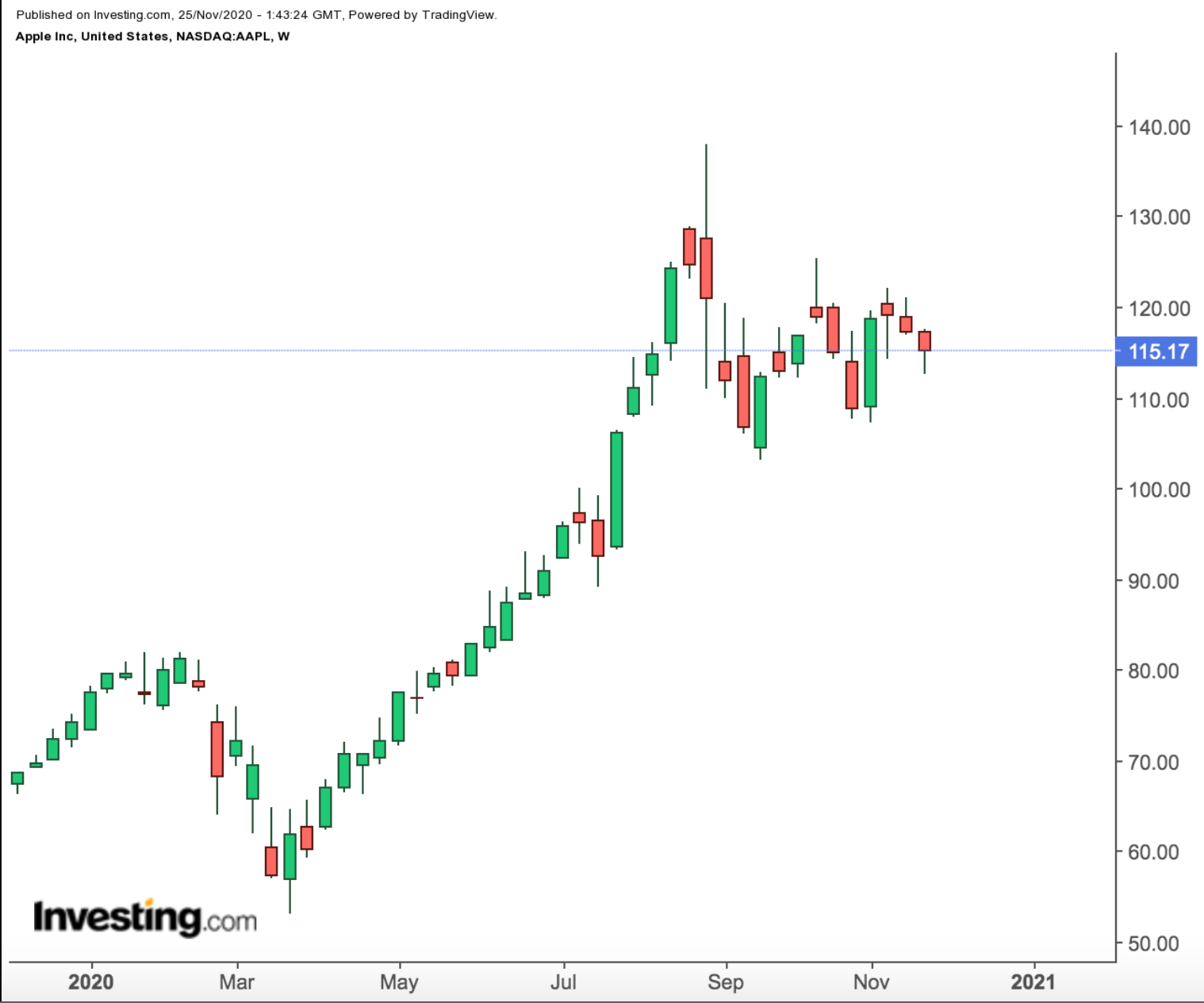Shares of Apple (NASDAQ:AAPL) are showing signs of peaking. After a remarkable run until early September, the iPhone-maker is now underperforming compared with other top tech companies amid uncertainties about its growth in the post-pandemic world.
This three-month bearish spell occurs after Apple became the first American company to surpass $2 trillion in market capitalization in August. Since then, its shares have lost 17%, closing yesterday at $115.17.
During the past three months, the tech-heavy NASDAQ has gained about 5%, while Apple has lost more than 8%.

One major concern that is keeping Apple stock depressed is whether the company will benefit from the potential economic rebound after the successful development of vaccines, which could potentially bring normalcy to the global economy by the middle of next year.
Apple benefited significantly during the pandemic, as an uptick in sales of laptops and iPads compensated for a significant drop in its flagship iPhone sales. In October, the California-based company reported that its iPhone revenue fell 21% in the quarter that ended in September. However, its revenue excluding the phones surged 25% compared with a year ago, with sales of Mac computers reaching a record $9 billion.
Some analysts on the Street see the iPhone's sluggish growth cycle extending well into 2021, when the stay-at-home boom will also be over. Goldman Sachs analyst Rod Hall, while lowering his firm's price target on Apple to $75 from $80, said in a recent note that Apple is unlikely to see a huge jump in iPhone demand despite its launch of new 5G-enabled models.
Apple's recent commentary "points toward the weaker 5G iPhone cycle we have been forecasting rather than the 'Super Cycle' expected by consensus," he wrote.
Apple generally introduces new iPhones models in September, giving its Q4 sales a considerable boost. But that production cycle got delayed this year due to supply disruptions caused by the COVID-19 outbreaks. Apple introduced its 5G-enabled models after Oct. 15, when the U.S. and European nations were in the midst of the second COVID-19 wave.
Bullish Narrative
But if Apple is able to revive iPhone growth in the current quarter, it will vindicate the bullish narrative of some analysts, who believe that competitive pricing on the new models, the first major redesign in three years, and the attraction of faster speed could prompt users to upgrade their phones.
Even with a tough environment for iPhone sales and the raging pandemic during its second wave, there are still many reasons to believe that Apple stock won’t lose its luster during the economic revival. The company has a lot of ammunition available to deal with the different economic cycles and to keep its growth momentum going.
Oppenheimer analyst Andrew Uerkwitz in a recent note reiterated an “outperform” rating and set a $125 price target for Apple after the company revealed M1, its in-house developed, system-on-chip (SoC) that will power future generations of MacBook and Mac Mini products.
"M1 integrates CPU and GPU, as well as other functional blocks, to enable faster machine learning and better hardware security,” he wrote in a recent note.
“The uniform architecture across Apple hardware will enable developers to scale up their reach and provide seamless software experience on different devices.”
Along with these hardware upgrades, there is also significant momentum in Apple’s services business, such as video and fitness apps, for use on more than 900 million iPhones worldwide. Sales from services more than doubled in fiscal 2019 compared with five years earlier. It rose 16% in the most recent quarter to $14.5 billion.
Bottom Line
Apple stock is likely to underperform during the fourth quarter as investors wait to see how consumers respond to the latest iPhone models during the crucial holiday period. We recommend long-term investors buy Apple stock on weakness, as the company is well-positioned to benefit from the post-pandemic economic rebound, backed by its constant innovation and thriving services business.
